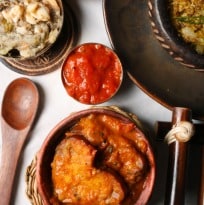From Manipur's sana thongba to Tripura's tokhan chicken, this restaurant brings the local flavours of north eastern states to the capital. Rosang opened its door in 2003 in Munirka and soon became a hub for authentic north-eastern food. It boasts of loyal customers from countries like Japan and Britain.Recently the restaurant highlighted Manipuri cuisine by organizing a food festival. The restaurant is run by a Manipuri couple Mary Lalboi and Muan Tonxing, who are also the chefs of the eating joint. Their passion for cooking and the desire to open a restaurant serving cuisines from all eight states of northeast - Nagaland, Mizoram, Manipur, Assam, Meghalaya, Arunachal Pradesh, Tripura and sikkim - brought them here."We had to shut it down in 2012 due to parking issues. Then we opened a branch in Safdarjung Enclave in 2006, but that caters more to home delivery services," says Lalboi.
Their choice of location has helped them get impressive footfalls. "A majority of our customers are from mainland India and not just from our region. People from Japan and Britain also come and eat at our restaurant. We also get foodies from Goa, Mumbai and Bangalore," said the entrepreneur.Sourced from different states of the northeast, the ingredients make people from the region feel homely and the others get to treat their taste buds with something different. "Be it herbs or even ginger, we get them flown from our region to ensure the authenticity and freshness," she said.The restaurant is an effort made by the couple to promote their culture through food. Priced at Rs.900 for a meal for two, one can enjoy sana thongba from Manipur, tokhan chicken from Tripura, bilahi masor tenga from Assam or nuoshi from Nagaland sitting in a cosy room on wooden furniture made by Tonxing.The thali was a visual treat. The red rice gives you a break from the usual white or brown rice. Placed right in the centre, it was surrounded by iromba - a cold preparation mostly of boiled vegetables and fermented fish. The mildly spiced dish went well with fried dry maroi bora and singju - made of raw vegetables like cabbage and lotus stem. The chicken curry served was also low on spices. With small pieces of onions and a heavy dose of turmeric, it was an absolute delight.The other bowl containing a yellow peas and bamboo shoot dish called mangan ooti looked darker than the usual. When asked, the chef said: "Pomegranate leaves have been added to it for flavour and colour." The traditional cuisine tasted even better with a red rice beverage. It has a striking resemblance to red tea but doesn't taste anything like it. Made with ground red rice and boiled water, it was so well strained that not a single rice piece floated could be found in the glass. The brown sugar and lemon peel made it even more flavoursome.The Manipuri food festival is on till May 31, those who miss home-cooked Manipuri food and those who like trying new cuisines must visit the Rosang.
Their choice of location has helped them get impressive footfalls. "A majority of our customers are from mainland India and not just from our region. People from Japan and Britain also come and eat at our restaurant. We also get foodies from Goa, Mumbai and Bangalore," said the entrepreneur.Sourced from different states of the northeast, the ingredients make people from the region feel homely and the others get to treat their taste buds with something different. "Be it herbs or even ginger, we get them flown from our region to ensure the authenticity and freshness," she said.The restaurant is an effort made by the couple to promote their culture through food. Priced at Rs.900 for a meal for two, one can enjoy sana thongba from Manipur, tokhan chicken from Tripura, bilahi masor tenga from Assam or nuoshi from Nagaland sitting in a cosy room on wooden furniture made by Tonxing.The thali was a visual treat. The red rice gives you a break from the usual white or brown rice. Placed right in the centre, it was surrounded by iromba - a cold preparation mostly of boiled vegetables and fermented fish. The mildly spiced dish went well with fried dry maroi bora and singju - made of raw vegetables like cabbage and lotus stem. The chicken curry served was also low on spices. With small pieces of onions and a heavy dose of turmeric, it was an absolute delight.The other bowl containing a yellow peas and bamboo shoot dish called mangan ooti looked darker than the usual. When asked, the chef said: "Pomegranate leaves have been added to it for flavour and colour." The traditional cuisine tasted even better with a red rice beverage. It has a striking resemblance to red tea but doesn't taste anything like it. Made with ground red rice and boiled water, it was so well strained that not a single rice piece floated could be found in the glass. The brown sugar and lemon peel made it even more flavoursome.The Manipuri food festival is on till May 31, those who miss home-cooked Manipuri food and those who like trying new cuisines must visit the Rosang.
Advertisement







